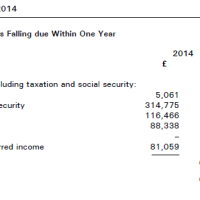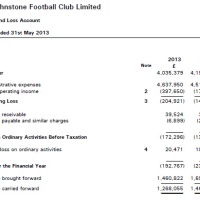St Johnstone Football Club Ltd v Scottish Football Association Ltd 1965
This morning I woke up to 1000 posts over on the Rangerstaxcase.com site after a Judicial review referred the Rangers transfer ban back to the SFA, as the SFA had chosen a punishment they were unable to make based on their articles of association. Likewise, FIFA released an immediate statement saying:
“In such a case, FIFA will ask the Member Association to take action so that the club withdraws its request from the ordinary courts. As a general rule, in case a club is seeking redress in front of ordinary court, as mentioned above the Member Association shall take direct action in order to safeguard the principle laid down in art. 64 par. 2 of FIFA Statutes, which shall be, in view of art. 64 par. 3 incorporated in the Member Associations’ Statutes. FIFA will closely monitor the situation so that the issue is resolved as fast as possible.”
But over on the Rangers boards, they are all rejoicing although they have won, citing the St.Johnstone v SFA case from 1965. Did you know Saints had taken the SFA to court. And won. And were not kicked out. So, what was the case about, why did we take them to court, what was the result, and why were we not kicked out? And how does this save/or not save Rangers bacon?
Back in 1965, St.Johnstone organized and played a benefit match for one of our players (I am yet to work out who – maybe someone with a copy of Bristling with Possibilities can work it out?). The club had not cleared this with the SFA however, in breach of their terms of membership.
The SFA promptly fined St.Johnstone 25GBP (yes, thats 25!)
St.Johnstone took the decision to a Judicial Review (the same body that just heard the Rangers case). Lord Kilbrandon heard the case, and ruled in favor of St.Johnstone, squashing the fine. However, there is a few major differences to the Rangers case.
Firstly, St.Johnstone were fined by the SFA without any notification at all that an inquiry was taking place. They were thus given no chance to defend themselves against the power brokers in the Scottish Football Association (source: International Sports Law and Business, Volume 1: By Aaron N. Wise, Bruce S. Meyer)
St.Johnstone FC v The SFA Ltd. The Scottish Association rendered a decision censuring and fining the St Johnstone Club for having arranged a benefit match for one of its players without formal Association approval. The club was never notified of the Associations intention to consider the matter and render a decision, thus, never had the opportunity to present its side of the case. The Scottish High Court, applying principles of natural justice, nullified the Associations decision. (emphasis added)
Further, Lord Kilbrandon found that: (source: JournalOnline)
“mere irregularity in procedure was not enough; it must be so fundamental that it goes beyond a mere matter of procedure and is something so prejudicial to a fair and impartial investigation of the question to be decided as to amount to a denial of natural justice. Examples would include conviction for an offence taking place without an accusation being made, or without allowing the person accused a reasonable opportunity to defend himself against the allegations.”
He also found that: (source: Experts Column and John O’Leary – Drugs and Doping in Sport Socio Legal Perspectives; Pg. 197)
“One of the company’s articles prohibited any member from taking legal proceedings of any kind against the company. It was held that this was contrary to public policy and therefore void.”
One rule described the Council as ‘the sole judges’, and another rule prohibited members taking legal proceedings on any matter without the consent of the SFA. These rules, he said, could produce ‘some remarkable consequences because it seems to import an agreement between the members and the association that members will renounce the jurisdiction of the courts’. If this was the correct interpretation, Lord Kilbrandon said, ‘the rule is to be construed as depriving the members of the association of the right to appeal to the courts of the land … then such a construction would be contrary to public policy, and ought not to be countenanced by these courts’.
What does the above mean? In layman’s terms it means that Saints were fined, without a hearing, or any chance of appeal. Saints took this to court, where it was ruled 1) You can’t fine someone without giving them a hearing, and 2) A rule which stops a member going to a court of law is itself against the law.
But whats the difference with Rangers? Didn’t they also win on a point of law that the SFA acted “ultra vires” by introducing a punishment that wasn’t stated? And surely they also have the same right in the Kilbrandon ruling stating that any rule preventing you going to the courts is ‘void’?
Firstly – unlike St.Johnstone in 1965, Rangers were afforded the opportunity to present a case, to an independent panel. They were further given the opportunity to appeal this decision. Something Saints never had. Saints only course of action was the Judicial Review as the SFA did not at the time make a provision for presenting a case, or appealing decisions.
Secondly – and most importantly. In 1965, the SFA were bound by their own articles of association, and the civil law of Scotland. There was NO FIFA or UEFA guidelines on how to handle a case brought about in a civil court. That, is very different now. The last amendment was made to Article 64 of the FIFA Articles as late as 1st August 2011, when a clause was added allowing FIFA bodies (eg, the SFA) to sanction members who fail to respect a decision made by the regulatory body (the SFA). The full and current FIFA articles can be found here, with the relevant bits of article 64 highlighted below:
Article 64 Obligation
2 Recourse to ordinary courts of law is prohibited unless specifically provided for in the FIFA regulations.
3 …..The Associations shall also ensure that this stipulation is implemented in the Association, if necessary by imposing a binding
obligation on its members. The Associations shall impose sanctions on any party that fails to respect this obligation and ensure that any appeal against such sanctions shall likewise be strictly submitted to arbitration, and not to ordinary courts of law.
To sum up, anyone quoting St.Johnstone Football Club Ltd v Scottish Football Association Ltd 1965 as a defence to the actions of Rangers football club is barking up the wrong tree. While operating under the same law, hence the decision of the Judicial Review to refer the decision back to the SFA, the rules governing the SFA and FIFA are very different in the present day. The transfer ban may very well be rescinded, but it is hard to see how Rangers will avoid serious punishment (up to expulsion) for its disregard for Article 64.
They may be right in the laws of the land, but the laws of the land give them no rights to play in a FIFA sanctioned competition. Atlantic League of One anyone?





